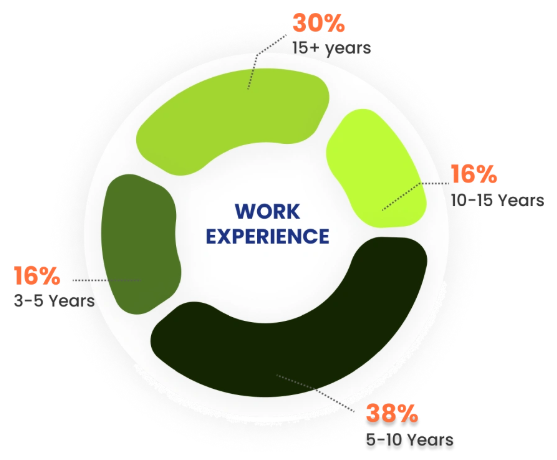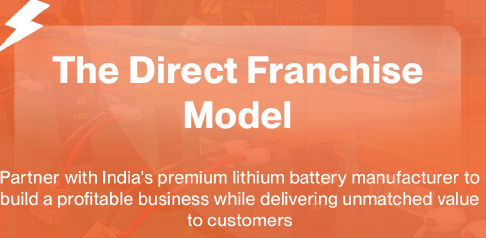MSME Govt of India Registered Autonomous institution.
Special session for working professionals, Business owners
Certificate in Client Relationship Development in PV Solar Projects (Online)
What you will learn?
1. Segment and understand your target market
Global Renewable Energy Scenario course would explore the current and future trends of renewable energy sources on a global scale.
Topics covered:
Market Scenario and Renewable Energy Sources, Applications of Solar Energy, State-wise Solar and Wind Capacity in India, Agricultural Solar Adoption, PM Surya Ghar Muft Bijli Yojana Scheme, Solar Power and Business Opportunities, Government Incentives, Bank Loans, GST, and Income Tax for Solar Projects, Solar Project Financing and Tax Benefits, Continuous Growth in the Solar Sector, Utility-Scale Projects, Growth of Solar Installation, Sector-wise Power Demand, State-wise Rooftop Solar Adoption Trends, Annual Rooftop Solar Installation Growth, Sector-wise SWOT Analysis.
Topics covered:
Market Scenario and Renewable Energy Sources, Applications of Solar Energy, State-wise Solar and Wind Capacity in India, Agricultural Solar Adoption, PM Surya Ghar Muft Bijli Yojana Scheme, Solar Power and Business Opportunities, Government Incentives, Bank Loans, GST, and Income Tax for Solar Projects, Solar Project Financing and Tax Benefits, Continuous Growth in the Solar Sector, Utility-Scale Projects, Growth of Solar Installation, Sector-wise Power Demand, State-wise Rooftop Solar Adoption Trends, Annual Rooftop Solar Installation Growth, Sector-wise SWOT Analysis.
2. Understand PV Solar Power Plant and Customer's needs
Customers considering a PV solar power plant have different needs depending on their goals, whether they are residential, commercial, or industrial. Key considerations include energy needs, budget, and system type.
Topics covered:
How a PV solar plant works? Solar panels (PV modules), Inverter, Net meter (for on-grid systems), Battery storage (for off-grid or hybrid systems), Mounting structure and other components.
Types of PV solar power plants - On-Grid, Off-Grid, Hybrid, Rooftop, Ground-Mounted, Floating Solar,
Customer needs and key considerations - To determine the best PV solution, customers need to assess their specific needs based on Energy consumption, Upfront cost and financing, Return on investment (ROI), Space availability, Reliability and backup, Regulation and incentives, Long-term warranty
Topics covered:
How a PV solar plant works? Solar panels (PV modules), Inverter, Net meter (for on-grid systems), Battery storage (for off-grid or hybrid systems), Mounting structure and other components.
Types of PV solar power plants - On-Grid, Off-Grid, Hybrid, Rooftop, Ground-Mounted, Floating Solar,
Customer needs and key considerations - To determine the best PV solution, customers need to assess their specific needs based on Energy consumption, Upfront cost and financing, Return on investment (ROI), Space availability, Reliability and backup, Regulation and incentives, Long-term warranty
Outcome
Can Understand PV solar power plant have different needs depending on their goals, whether they are residential, commercial, or industrial.3. Educate clients and set clear expectations
Since many clients are unfamiliar with solar technology, your role is to simplify the process and act as a reliable educational resource. Clear, transparent, and proactive communication helps build trust, manage expectations, and increase customer satisfaction.
Topics covered:
Awareness and consultation - At the beginning, focus on answering fundamental questions and dispelling common myths - Solar is too expensive, Solar panels don't work in cloudy weather, Solar provides power during a blackout, require high cost maintenance, needing a new roof or an electrical panel upgrade, Solar system is not safe etc.
Set clear and honest expectations - Power security, Reduce Electricity bill, Save money, Fulfill power requirement for 30 years, Financial projections, Discuss incentives ROI, Offer flexible financing.
Topics covered:
Awareness and consultation - At the beginning, focus on answering fundamental questions and dispelling common myths - Solar is too expensive, Solar panels don't work in cloudy weather, Solar provides power during a blackout, require high cost maintenance, needing a new roof or an electrical panel upgrade, Solar system is not safe etc.
Set clear and honest expectations - Power security, Reduce Electricity bill, Save money, Fulfill power requirement for 30 years, Financial projections, Discuss incentives ROI, Offer flexible financing.
Outcome
Clear, transparent, and proactive communication helps build trust, manage expectations, and increase customer satisfaction.4. Pre-installation support strategies
Pre-installation support is vital for retaining photovoltaic (PV) solar customers by building trust, managing expectations, and ensuring a smooth installation process.
Topics covered:
Detailed consultation: Go beyond the standard sales pitch. Explain how solar energy works, outline the components of the proposed system (panels, inverters, batteries), and discuss factors that affect energy production.
Clarify savings and ROI: Use realistic numbers based on their actual energy consumption to manage financial expectations. Provide a transparent breakdown of all costs, including permits, installation, and equipment, to avoid surprise fees.
Conduct a thorough site assessment: A detailed, professional site evaluation should be done early to confirm the roof's structural integrity and load-bearing capacity
project timelines: Clearly outline the entire project timeline, including permitting, installation, and final inspections.
Offer clear financing options: Present financing options, such as loans or leases, transparently. Collaborate with financial partners to offer competitive rates and flexible repayment options, which can help overcome the barrier of high upfront costs.
Making realistic promises, rather than overpromising system output.
Topics covered:
Detailed consultation: Go beyond the standard sales pitch. Explain how solar energy works, outline the components of the proposed system (panels, inverters, batteries), and discuss factors that affect energy production.
Clarify savings and ROI: Use realistic numbers based on their actual energy consumption to manage financial expectations. Provide a transparent breakdown of all costs, including permits, installation, and equipment, to avoid surprise fees.
Conduct a thorough site assessment: A detailed, professional site evaluation should be done early to confirm the roof's structural integrity and load-bearing capacity
project timelines: Clearly outline the entire project timeline, including permitting, installation, and final inspections.
Offer clear financing options: Present financing options, such as loans or leases, transparently. Collaborate with financial partners to offer competitive rates and flexible repayment options, which can help overcome the barrier of high upfront costs.
Outcome
For the business, effective pre-installation support is a critical strategy that yields a competitive advantage and a healthier bottom line.Making realistic promises, rather than overpromising system output.
5. During project installation
The CRM serves as the primary point of contact, ensuring the project stays on track and the customer remains satisfied from the beginning of installation to final system activation.
Topics covered:
Manage expectations on timeline, Serve as the single point of contact, Escalate issues promptly, Manage unexpected issues, confirm that the system was installed to their satisfaction, Collect and organize documentation, Confirm utility coordination
Provide system operation details and Answer technical questions.
Topics covered:
Manage expectations on timeline, Serve as the single point of contact, Escalate issues promptly, Manage unexpected issues, confirm that the system was installed to their satisfaction, Collect and organize documentation, Confirm utility coordination
Provide system operation details and Answer technical questions.
Outcome
The outcome knowledge would include effective communication and expectation management, as well as an understanding of the technical and financial aspects of solar projects.6. Post-installation engagement and retention
After installing a solar power system, engaging and retaining customers relies on proactive communication, comprehensive support, and using technology to deliver a high-value experience.
Topics covered:
Real-time performance tracking, Comprehensive support plan - A quick response to inquiries is essential for building trust and reinforcing your commitment.
Identifying and closing upsell and cross-sell opportunities, Provide ongoing support, feedback, Leveraging social proof, Encourage satisfied clients to recommend new customer,
Topics covered:
Real-time performance tracking, Comprehensive support plan - A quick response to inquiries is essential for building trust and reinforcing your commitment.
Identifying and closing upsell and cross-sell opportunities, Provide ongoing support, feedback, Leveraging social proof, Encourage satisfied clients to recommend new customer,
Outcome
Key outcomes include managing post-sales support, enhancing customer satisfaction, and leveraging long-term relationships for growth.7. Build brand credibility and market presence
Client relationship management is a vital component of building brand credibility and market presence in PV solar projects. A successful strategy involves defining a unique value proposition (UVP), leveraging high-quality system.
Topics covered:
How to Build and maintain trust and maintain transparency, Drive customer satisfaction and positive word-of-mouth through Excellent service, Showcase social proof and Referral.
Grow market presence - Local branding, Engage on social media.
Topics covered:
How to Build and maintain trust and maintain transparency, Drive customer satisfaction and positive word-of-mouth through Excellent service, Showcase social proof and Referral.
Grow market presence - Local branding, Engage on social media.
8. PV Project Documents
PV (Photovoltaic) project documentation refers to the collection of documents required for the planning, execution, and
operation of a solar power project. This documentation includes technical specifications, financial details, and
project management plans. Key documents often include site plans, system designs, component specifications, financial models,
and permits.
Topics covered:
Documentation in PV Design, Project Report and User Guides, Array Junction Box (AJB) Drawing, Power Plant Electrical Diagram and Layout, Earthing System and Lightning Protection, Module Installation and String Configuration, Rooftop Installation Considerations, Detailed Project Report (DPR) - Site Assessment in the DPR, Solar Radiation Resource Assessment in the DPR, Project Scenarios and Power Purchase Agreements (PPAs), Small Project Report Making, Work Order and Procurement, Business Strategy and Proposal Development, Technical Proposal Details, Commercial Estimation and Terms.
Topics covered:
Documentation in PV Design, Project Report and User Guides, Array Junction Box (AJB) Drawing, Power Plant Electrical Diagram and Layout, Earthing System and Lightning Protection, Module Installation and String Configuration, Rooftop Installation Considerations, Detailed Project Report (DPR) - Site Assessment in the DPR, Solar Radiation Resource Assessment in the DPR, Project Scenarios and Power Purchase Agreements (PPAs), Small Project Report Making, Work Order and Procurement, Business Strategy and Proposal Development, Technical Proposal Details, Commercial Estimation and Terms.
Outcome
Identifying Key Documents, Understanding Document Purpose, Contributing to Document Development, Reading and interpreting electrical schematics, Understanding bill of materials (BOM), Understanding site assessment reports, Understanding installation plans, Understanding operation and maintenance (O&M)Past Participant Profile

Top Job Profiles
- Director/Founder
- Programme Managers
- Project Lead/Project Mgrs
- EPC Associate
- Startup
Quick Inquiry Form
Several institutions play a significant role in PV solar technology training in India.
Notably, the Institute of Solar Technology (IST) has trained over 100000 solar entrepreneurs since 2014 and
offers online and practical courses focused on development and quality management of solar power projects,
including rooftop and ground-mounted systems.

Interactive Classes

Practical & Doubt Classes

E-Library Study Materials

Online Examination














